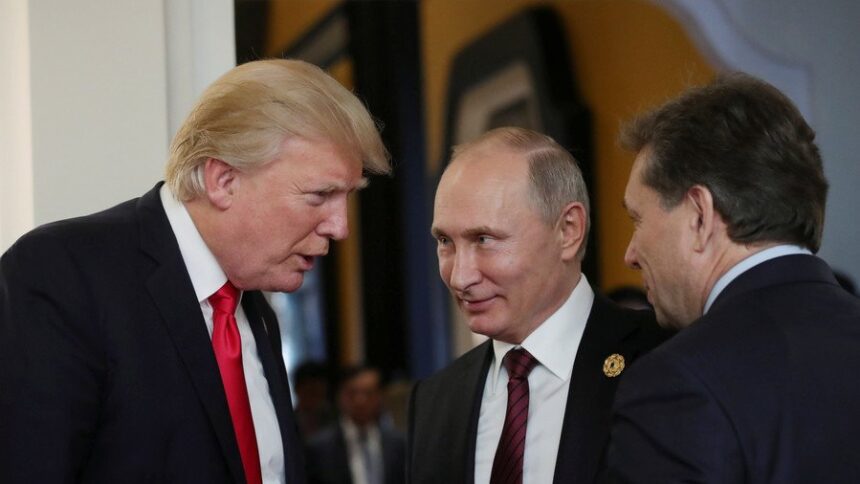FILE – In this photo released by the Russian Defense Ministry Press Service on Friday, April 19, 2024, Russian Defense Minister Sergei Shoigu, second right, visits a factory workshop as he checks the implementation of the state defense order at an enterprise of the military-industrial complex in the Omsk region of Russia, which produces tanks and heavy flamethrower systems. (Russian Defense Ministry Press Service via AP, File)
Hundreds of foreign companies left Russia after the 2022 invasion of Ukraine, including major U.S. firms like Coca-Cola, Nike, Starbucks, ExxonMobil and Ford Motor Co.
But after more than three years of war, President Donald Trump has held out the prospect of restoring U.S.-Russia trade if there’s ever a peace settlement. And Russian President Vladimir Putin has said foreign companies could come back under some circumstances.
“Russia wants to do largescale TRADE with the United States when this catastrophic ‘bloodbath’ is over, and I agree,” Trump said in a statement after a phone call with Putin. “There is a tremendous opportunity for Russia to create massive amounts of jobs and wealth. Its potential is UNLIMITED.”
The president then shifted his tone toward Putin after heavy drone and missile attacks on Kyiv, saying Putin “has gone absolutely crazy” and threatening new sanctions. That and recent comments from Putin warning Western companies against reclaiming their former stakes seemed to reflect reality more accurately — that it’s not going to be a smooth process for businesses going back into Russia.
That’s because Russia’s business environment has massively changed since 2022. And not in ways that favor foreign companies.
And with Putin escalating attacks and holding on to territory demands Ukraine likely isn’t going to accept, a peace deal seems distant indeed.
Russian law classifies Ukraine’s allies as “unfriendly states” and imposes severe restrictions on businesses from more than 50 countries. Those include limits on withdrawing money and equipment as well as allowing the Russian government to take control of companies deemed important. Foreign owners’ votes on boards of directors can be legally disregarded.
Companies that left were required to sell their businesses for 50% or less of their assessed worth, or simply wrote them off while Kremlin-friendly business groups snapped up their assets on the cheap. Under a 2023 presidential decree the Russian government took control of Finnish energy company Fortum, German power company Unipro, France’s dairy company Danone and Danish brewer Carlsberg.
Even if a peace deal removed the U.S. from the list of unfriendlies, and if the massive Western sanctions restricting business in Russia were dropped, the track record of losses would remain vivid. And there’s little sign any of that is going to happen.
While the Russian government has talked in general about companies coming back, “there’s no specific evidence of any one company saying that they are ready to come back,” said Chris Weafer, CEO of Macro-Advisory Ltd. consultancy. “It’s all at the political narrative level.”
Russia’s actions and legal changes have left “long-lasting damage” to its business environment, says Elina Ribakova, non-resident senior fellow at the Bruegel research institute in Brussels.
She said a return of U.S. businesses is “not very likely.”
‘We need to strangle them’
In a meeting at the Kremlin on May 26 to mark Russian Entrepreneurs Day, Putin said that Russia needed to throttle large tech firms such as Zoom and Microsoft, which had restricted their services in Russia after Moscow’s invasion of Ukraine, so that domestic tech companies could thrive instead.
“We need to strangle them,” Putin said. “After all, they are trying to strangle us: we need to reciprocate. We didn’t kick anyone out; we didn’t interfere with anyone. We provided the most favorable conditions possible for their work here, in our market, and they are trying to strangle us.”
He reassured a representative from Vkusno-i Tochka (Tasty-period) — the Russian-owned company that took over McDonald’s restaurants in the country — that Moscow would aid them if the U.S. fast food giant tried to buy back its former stores. Asked for comment, McDonald’s referred to their 2022 statement that “ownership of the business in Russia is no longer tenable.”





